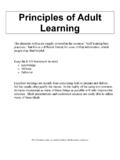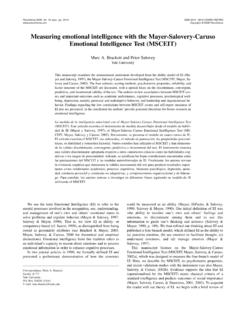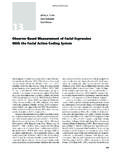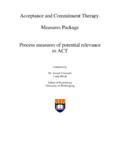Transcription of Emotional Intelligence: Understanding, Applying, …
1 Emotional intelligence : understanding , applying , and MeasuringRandall Grayson, , developmental, & organizational psychology applied to utilize the audio that accompanies this presentation in order to benefit fully Randall Grayson, of the session Understand what Emotional intelligence (EQ) is and why it is important Obtain an overview of the EQ domains Delineate parenting/counseling styles that foster or fail to grow EQ Be exposed to general EQ building principles Understand what the measurement options are Randall Grayson, / Caveats Normally do this over a day, but Tri-state is only 1 hours Better to have fuzzy whole picture than a small, clear piece of it Focus is on understanding instead of application (which is touched on)How to increase or application would each be a session in itself Couldn t give you 40 page handouts, but can download other information from my website Greater detail on what EQ is Self-assessment for EQ parenting/counseling style Greater detail on how to raise an emotionally intelligent child Complete behavior management plan for raising an emotionally intelligent child applying EQ to interpersonal relationships Randall Grayson, are your expectations?
2 Why are you here? Randall Grayson, ) Introduction i) What is Emotional intelligence ? ii) Domains of Emotional intelligence iii) Why is EQ so important 2) Emotional intelligence in detail i) Intrapersonal ii) Interpersonal iii) Adaptability iv) Stress management v) General mood 3) Emotionally intelligent parenting i) Dismissing ii) Disapproving iii) Laissez-faire iv) Emotion coaching (a) The emotion-coaching process (b) Problem-solving process 4) General EQ building principles 5) measuring EQ 6) Useful web sites 7) Book shelf Randall Grayson, is Emotional intelligence (EQ) The word intelligence did not appear in books before the twentieth century intelligence wasn t common until after 1930 The term Emotional intelligence does not yet appear in dictionaries Randall Grayson, is EQ? Emotional intelligence addresses the Emotional , personal, social, and survival dimensions of intelligence EQ is concerned with understanding oneself and others, relating to people, and adapting to and coping with the immediate surroundings A dictionary definition might include an array of noncognitive capabilities, competencies, and skills that influence one s ability to succeed in coping with environment demands and pressures.
3 Mr. Spock and PBS brain injury case study Randall Grayson, of Emotional IntelligenceIntrapersonal Emotional self-awareness Assertiveness Self-regard Self-actualization IndependenceInterpersonal Empathy Interpersonal relationship Social responsibilityAdaptability Problem-solving Reality testing FlexibilityStress management Stress tolerance Impulse controlGeneral mood Happiness Optimism Randall Grayson, is EQ so important? (1 of 3)From Goleman & Gottman s books predicts higher work performance three times better than Prediction range varies between 15 45% Leadership is largely an Emotional intelligence . All interaction can be gauged along a continuum from emotionally toxic to nourishing Two-thirds of workers say communication problems are the leading cause preventing them from doing their best work. is one of the best predictors of divorce and marital satisfaction Randall Grayson, is EQ so important?
4 (2 of 3)From Dr. BarOn s research EQ scores help predict: Academic drop out Ability to cope with severe medical condition Aggression in the work place Suicide attempts Ability to recover from mental illness EQ scores help discriminate between: Members of Young President s Association and chronically unemployed Prisoners and a local normative sample Successful and unsuccessful alcohol treatment participants Therapists and their clients Randall Grayson, is EQ so important? (3 of 3)From Goleman, Gottman, & Pipher Over the past two decades, children have become more: Depressed and lonely Impulsive and disobedient Nervous, prone to worry, and irritable Prone to eating disorders What are some possible causes? Parents have less free-time with their children Less relatives in children s lives these days Both parents often work There is more TV watching and computer game playing One learns EQ from a social life, which has been decreasing. Randall Grayson, in more detail (1 of 8)Intrapersonal Emotional self-awarenessAbility to be aware of one s feelings and emotions, to be able to differentiate between them, to know what one is feeling and why,and to know what caused the feelings.
5 Thrive on open, honest, compassionate feedback AssertivenessThe ability to express feelings, beliefs, and thoughts and defend one s rights in a nondestructive manner. Assertive people are not overcontrolled or shy. Can express themselves without being aggressive or abusive. Randall Grayson, in more detail (2 of 8)Intrapersonal (cont.) Self-regardThe ability to accept one s perceived positive and negative aspects as well as one s limitations and possibilities. This person possesses inner strength and self-confidence. Self-actualizationThe ability to realize one s potential capacities. Involved in pursuits that lead to a meaningful, rich, and full life. Self-actualization is an ongoing, dynamic process of striving toward maximum development of one s abilities, capacities, and talents. This person persistently tries to improve oneself in general. Randall Grayson, in more detail (3 of 8)Intrapersonal (cont.) IndependenceThe ability to function autonomously versus needing protection and support.
6 These people have self-confidence, inner strength, and a desire to meet expectations and obligations, without becoming a slave to them Interpersonal EmpathyThe ability to be aware of, to understand, and to appreciate the feelings of others. It is tuning in (being sensitive) to what, how, and why people feel the way they do. Being empathetic means being able to emotionally read other people. Randall Grayson, in more detail (4 of 8)Interpersonal (cont.) Interpersonal relationshipThe ability to establish and maintain mutually satisfying relationships that are characterized by intimacy and by giving and receiving affection. This component is not only associated with the desirability of cultivating friendly relations with others, but with the ability to feel at ease and comfortable in such relations. Social responsibilityThe ability to demonstrate oneself as a cooperative, contributing, and constructive member of one s social group. This ability involves acting in a responsible manner, even though one may not benefit personally.
7 This person takes on community-oriented responsibilities. Randall Grayson, in more detail (5 of 8)Adaptability Problem-solvingThe ability to identify and define problems as well as to generate and implement potentially effective solutions. This person logically and methodically goes through a problem and picks the best skill is also linked to a desire to do one s best and to confront problems, rather than avoiding them. Reality testingThe ability to assess the correspondence between what is experienced and what objectively exists. This person searches for objective evidence to confirm, justify, and support feelings, perceptions, and thoughts. In simple terms, reality testing is the ability to accurately size up the immediate situation. Randall Grayson, in more detail (6 of 8)Adaptability (cont.) FlexibilityAbility to adapt to unfamiliar, unpredictable, and dynamic circumstances. Flexible people are agile, synergistic, and capable of reacting to change, without rigidity.
8 These people are able to change their minds when evidence suggests that they are mistaken. They are generally open to and tolerant of different ideas, orientations, ways, and practices. Randall Grayson, in more detail (7 of 8)Stress management Stress toleranceThe ability to withstand adverse events and stressful situations without falling apart by actively and positively coping with stress. Also involves problem-solving, optimism, knowledge of stress coping strategies, and practice using them. People who have good stresstolerance tend to face crises and problems, rather than surrendering to feelings of helplessness and hopelessness. Impulse controlThe ability to resist or delay an impulse, drive, or temptation to act. Problems in impulse control are manifested by low frustration tolerance, impulsiveness, anger control problems, abusiveness, loss of self-control, and explosive and unpredictable behavior. Sometimes this skill is also called self-regulation or delaying gratification.
9 It involves self-control and the ability to handle our emotions. Randall Grayson, in more detail (8 of 8)General mood HappinessThe ability to feel satisfied with one s life, to enjoy oneself and others, and to have fun. Happy people often feel good and at ease in both work and leisure; they are able to let their hair down, and enjoy the opportunities for having fun. Happiness is a by-product and/or barometric indicator of one s overall degree of Emotional intelligence and Emotional functioning. OptimismOptimism is the ability to look at the brighter side of life and to maintain a positive attitude, even in the face of adversity. Optimism assumes a measure of hope in one s approach to life. It is a positive approach to daily living. Optimism is the opposite of pessimism,which is a common symptom of depression. Randall Grayson, review1) Introduction i) What is Emotional intelligence ? ii) Domains of Emotional intelligence iii) Why is EQ so important 2) Emotional intelligence in detail i) Intrapersonal ii) Interpersonal iii) Adaptability iv) Stress management v) General mood 3) Emotionally intelligent parenting i) Dismissing ii) Disapproving iii) Laissez-faire iv) Emotion coaching (a) The emotion-coaching process (b) Problem-solving process 4) General EQ building principles 5) measuring EQ 6) Useful web sites 7) Book shelf Randall Grayson, intelligent counseling/parentingIn EQ language Dismissing Disapproving Laissez-faire Emotion-coachingBaumrind s typology Authoritarian / Uninvolved Authoritarian / Uninvolved Permissive AuthoritativeFour parenting counseling stylesWearing many hats Randall Grayson, dismissing parent (1 of 3)
10 Characteristics Treats child's feelings as unimportant, trivial Disengages from or ignores the child's feelings Wants the child's negative emotions to disappear quickly Characteristically uses distraction to shut down child's emotions Does not problem-solve with the child; believes that the passage of time will resolve most problems Focuses more on how to get over emotions than on the meaning of the emotion itself They often like to shrink the problem down to size, encapsulate it, and put it away so it can be forgotten Randall Grayson, dismissing parent (2 of 3)Examples When a pet dies, it s Oh, don t worry, we ll get a new one. and he was getting old and it was time for him to die. Don t confront and talk about child s sadness and perhaps fear of own death or parents death. Child needs to feel both understood and comforted. When Jimmy is sad it makes me sad because you want to think that your kids are happy and well-adjusted. I just don t want to see him upset.












